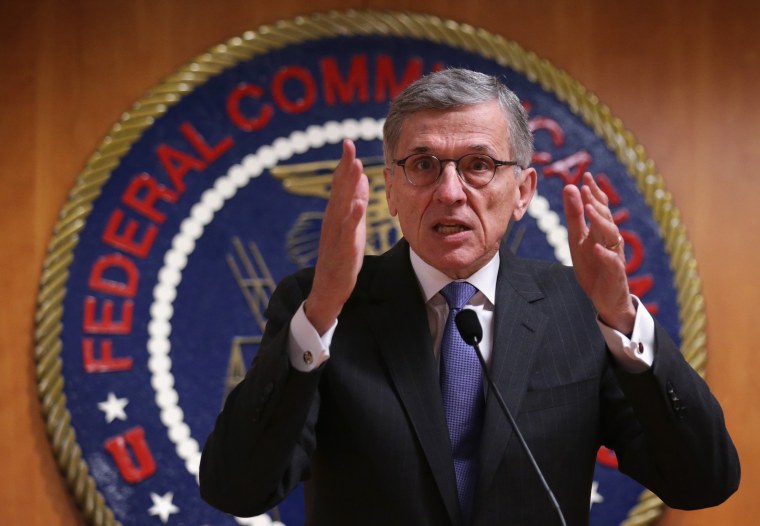Commissioners of the Federal Communications Commission (FCC) are set to discuss a new proposal on Internet trafficking rules drafted by FCC chairman Tom Wheeler, but the controversy surrounding the proposal, and over ‘net neutrality’ in general, has been ongoing for months.
Net neutrality advocates worry that the proposal could allow Internet Service Providers (like Verizon and MSNBC’s parent company Comcast) to divide Internet content into so-called ‘fast’ and ‘slow’ lanes depending on how much providers of that content (like Netflix, which, along with Youtube, accounts for nearly half of all Internet traffic according to CNET) pay for their service. These ‘fast lanes’, they argue, would favor large firms who could afford to pay and put startups at an unfair disadvantage, thus stifling innovation. Tech giants such as Facebook and Amazon called these new rules “a grave threat to the Internet” in a May 8 letter to the FCC. And Tim Wu, the Columbia professor who coined the term ‘net neutrality’ writes in the New Yorker that the new rules “threatens to make the Internet just like everything else in American society: unequal in a way that deeply threatens our long-term prosperity.”
Net neutrality advocates believe that their preferred solution is simple - simply reclassify broadband services as ‘common carriers’ , which, loosely defined, are services that are legally bound to cater to all, without discrimination, upon reasonable demand. Common carriage is a subtle but crucial pillar of the modern economy; it applies to anything from taxicabs to telephones. The 1934 Telecommunications Act gave the FCC broad powers to regulate telephone companies as common carriers. In 2002, however, the FCC categorized broadband services as ‘information services’, a category created in 1996 with fewer limitations.
The latest round in the battle over ‘net neutrality’ was sparked by a Federal Appeals Court decision in January that essentially argues that by not treating broadband providers as ‘common carriers’, the FCC could not prevent broadband services from charging for higher delivery speeds.
So what is preventing the FCC from simply re-classifying broadband providers as common carriers? Many net neutrality experts believe it comes down to just this: “error correction”, in the words of Tim Wu.
For their part, broadband service providers are strongly opposed to this reclassification; in a statement given to MSNBC, Comcast states “we continue to support the FCC’s authority to issue a balanced new Open Internet Order. However...common carrier regulation under Title II would be inappropriate. The Internet has continued to flourish over the past decade as ISPs have invested and innovated, bringing faster speeds and more Wi-Fi to consumers. Title II regulation would threaten this enormous success of private investment in the Internet.” These concerns were also reflected in a letter to the FCC sent out by the CEOs of AT&T, Comcast, Verizon and Time Warner Cable, arguing “the burdens and uncertainty associated with Title II regulation… would deter broadband providers from making the substantial additional investments required to deploy new and upgraded broadband infrastructure.”
According to the Harvard Business Review, service providers are set to spend $30 billion annually in next-generation broadband, investment that could be stifled if common carrier regulation deprives these firms of revenue. One of the five FCC commissioners set to discuss the proposals tomorrow referred to net neutrality as a “solution in search of a problem”.
Politicians from both parties have stepped into the debate in recent days. On Tuesday, Senate Minority Leader Mitch McConnell and five other Senate Republicans wrote a letter urging Tom Wheeler to stand down on any new net neutrality regulation whatsoever, in effect, echoing the arguments of the telecommunications companies. This comes as Senate Democrats wrote their own letter to the FCC last Friday, speaking out against the potential development of ‘fast’ and ‘slow’ lanes.
The FCC is set to open a lengthy period of public comment after Chairman Wheeler formally proposes the rules today. In the meantime, Internet heavyweights, broadband services, activists and both parties are preparing for what could be a prolonged battle over the future of the Internet.
